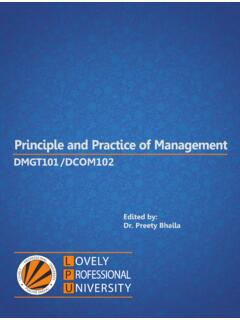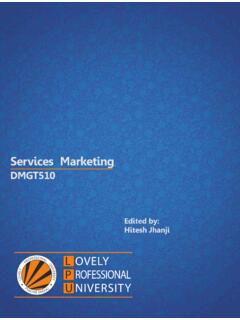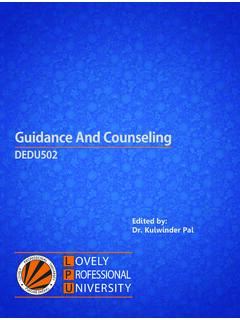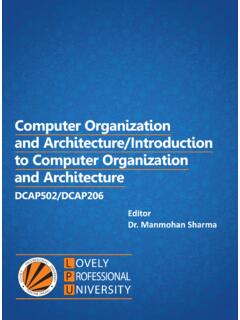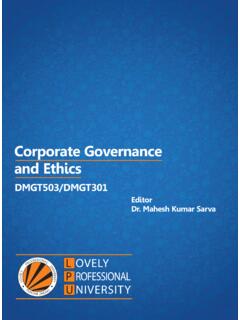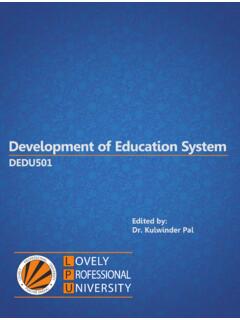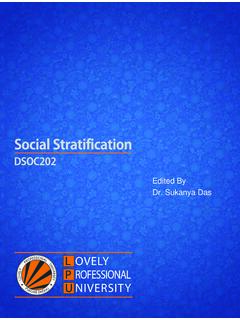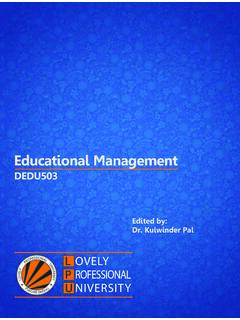Transcription of WESTERN POLITICAL THOUGHT
1 WESTERN POLITICALTHOUGHTDPOL201 Edited byDr. Sukanya Das WESTERN POLITICAL THOUGHTE dited By:Dr. Sukanya Das Printed byUSI PUBLICATIONS2/31, Nehru Enclave, Kalkaji Ext.,New Delhi-110019forDirectorate of Distance EducationLovely Professional UniversityPhagwaraSYLLABUS WESTERN POLITICAL ThoughtObjectives1. This paper studies the classical tradition in POLITICAL theory from Plato to Rawls with the view to understand how the greatMasters explained and analyzed POLITICAL events and problems of their time and prescribed The paper aims at the comparison of the ideas of different POLITICAL philosophers and The legacy of the thinkers is explained with a view to establish the continuity and change within the WESTERN politicaltradition.
2 Sr. : Republic, ideal state: theory of justice, communism, education2 Aristotle: Organic theory of state, classification of states, theory of revolution3 Niccolo Machiavelli: Separation of ethics from politics, State craft4 Thomas Hobbes: individualism , social contract5 John Locke: State of nature and Natural rights and property, Social contract theory6 Jean-Jacques Rousseau: Human nature, social contract, general will7 Jeremy Bentham: Utilitarianism, theory of state and government8 Friedrich Hegel: Dialectics, theory of state and freedom9 Karl Marx: Historical materialism and class struggle, Dialectical materialism, Theory of surplus value10 John Stuart Mill: Theory of liberty, representative governmentCONTENTUnit 1:Plato s Life, His Ideal State and Theory of JusticeSukanya Das, Lovely Professional University 1 Unit 2:Plato s Communism and Theory of EducationRosy Hastir, Lovely Professional University14 Unit 3.
3 Aristotle s Life and His Conception of Human Nature and StateSukanya Das, Lovely Professional UniversityRipudaman Singh, Lovely Professional University 27 Unit 4:Aristotle s Theory of RevolutionSukanya Das, Lovely Professional UniversityAmandeep Singh, Lovely Professional University 42 Unit 5:Niccolo MachiavelliRosy Hastir, Lovely Professional UniversityAmandeep Singh, Lovely Professional University 65 Unit 6:Thomas HobbesRosy Hastir, Lovely Professional UniversityAmandeep Singh, Lovely Professional University 87 Unit 7.
4 John LockeSukanya Das, Lovely Professional UniversityAmandeep Singh, Lovely Professional University 106 Unit 8:Jean Jacques RousseauRosy Hastir, Lovely Professional UniversityAmandeep Singh, Lovely Professional University 127 Unit 9:Jeremy BenthamSukanya Das, Lovely Professional UniversityJyoti, Lovely Professional University 149 Unit 10:George Wilhelm Friedrich Hegel Sukanya Das, Lovely Professional UniversityKirandeep Singh, Lovely Professional University 173 Unit 11:Karl Marx.
5 His Life and Works, Materialism and Dialectical MaterialismSukanya Das, Lovely Professional UniversityKirandeep Singh, Lovely Professional University 197 Unit 12:Karl Marx: Class Struggle and Social Change and Theory of Surplus ValueSukanya Das, Lovely Professional UniversityKirandeep Singh, Lovely Professional University 213 Unit 13:John Stuart Mill s His Life and Theory of Liberty Sukanya Das, Lovely Professional UniversityManu Sharma, Lovely Professional University 234 Unit 14:John Stuart Mill Representative GovernmentSukanya Das, Lovely Professional UniversityManu Sharma, Lovely Professional University 250 Unit 1.
6 Plato s Life, His Ideal State and Theory of JusticeNotesLOVELY PROFESSIONAL UNIVERSITY1 Unit 1: Plato s Life, His Ideal State and Theory of Life The Ideal Theory of Review Further ReadingsObjectivesAfter studying this unit students will be able to: Know about the Republic Understand Plato s Ideal State Evaluate Plato s Theory of the history of POLITICAL THOUGHT no thinker evoked the admiration, reverence and criticism thatPlato (428/27-347 BC) did. This outstanding Greek philosopher has left behind many importantworks, out of which three, the Republic, (380-370 BC), the Statesman (360 BC) and the Laws (350 BC),are of perennial interest to all those interested in the history of POLITICAL ideas.
7 Plato has beengenerally regarded as the founder of philosophical idealism by virtue of his conviction that thereis a universal idea in the world of eternal reality beyond the world of the senses. He was the firstto formulate and define POLITICAL ideas within a larger framework of a philosophical idea of was concerned human life and human soul or human nature, and the real question in it is as Platosays, how to live best .. what is the best life?.. is to him inseparable from the question,what is [the] best order or organization of human society (Nettleship 1967: 5).Plato perceived POLITICAL philosophy as an architectonic science of society, and like Socrates (469-399 BC) and the Sophists, distinguished the POLITICAL from the other dimensions of life.
8 Within theEuropean intellectual tradition he conceptualized the disorders and crises of the actual world andpresented to his readers a vision of a desirable POLITICAL order, which till today fascinates hisadmirers and detractors. He has been described as a poet of ideas, a philosopher of beauty and thetrue founder of the cult of harmonious living. He has been praised for his denunciation of crassmaterialism and brutish selfishness. Both Francois-Marie Arouet Voltaire (1694-1778) and FriedrichWilhelm Nietzsche (1844-1900) characterized Platonism as the intellectual side of Christianity(1955).
9 Many like John Ruskin (1819-1900) and William Morris (1834-1896) were attracted byPlato s concern for human perfection and excellence. ralph waldo emerson (1803-1882) exclaimedecstaticallySukanya Das, Lovely Professional University WESTERN POLITICAL ThoughtNotes2 LOVELY PROFESSIONAL UNIVERSITYP lato is philosophy and philosophy is Plato for out of Plato comes all things that arestill written and debated among men of THOUGHT .. Burn the libraries for their valuein this has been credited for laying the foundations of Greek POLITICAL theory, as he explored,analyzed and covered a wide range of philosophical perspectives and issues, on which the Westernpolitical tradition rests.
10 Aristotle, a critic of Platonic ideas in the Republic, rejected many of them,but extends Plato s formulation in the Laws. It is for this reason that Whitehead, paying the mostfitting tribute to Plato stated that the entire European philosophical tradition is nothing but a setof footnotes to Plato s admirers have been numerous, he has had his share of critics too, beginning withAristotle. Most of his recent critics have been in the twentieth century within the liberal assailed Plato for his hostility towards progressive, humanitarian and democratic ideals,and regarded him as the philosophical forerunner of modern day totalitarianism, which itself is atwentieth century phenomenon.
